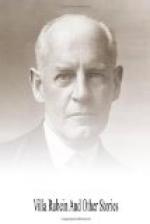Christian rose, and, turning very softly, stood, leaning her elbows on the back of a high seat, looking at her husband.
In her eyes there was a slow, clear, faintly smiling, yet yearning look, as though this strenuous figure bent on its task were seen for a moment as something apart, and not all the world to her.
“Tired?” asked Harz, putting his lips to her hand.
“No, it’s only—what Greta says about the Spring; it makes one want more than one has got.”
Slipping her hand away, she went back to the window. Harz stood, looking after her; then, taking up his palette, again began painting.
In the world, outside, the high soft clouds flew by; the trees seemed thickening and budding.
And Christian thought:
‘Can we never have quite enough?’
December 1890.
TO
MY FATHER A MAN OF DEVON I
“Moor, 20th July.
.......It is quiet here, sleepy, rather--a farm is never quiet; the sea, too, is only a quarter of a mile away, and when it’s windy, the sound of it travels up the combe; for distraction, you must go four miles to Brixham or five to Kingswear, and you won’t find much then. The farm lies in a sheltered spot, scooped, so to speak, high up the combe side—behind is a rise of fields, and beyond, a sweep of down. You have the feeling of being able to see quite far, which is misleading, as you soon find out if you walk. It is true Devon country-hills, hollows, hedge-banks, lanes dipping down into the earth or going up like the sides of houses, coppices, cornfields, and little streams wherever there’s a place for one; but the downs along the cliff, all gorse and ferns, are wild. The combe ends in a sandy cove with black rock on one side, pinkish cliffs away to the headland on the other, and a coastguard station. Just now, with the harvest coming on, everything looks its richest, the apples ripening, the trees almost too green. It’s very hot, still weather; the country and the sea seem to sleep in the sun. In front of the farm are half-a-dozen pines that look as if they had stepped out of another land, but all round the back is orchard as lush, and gnarled, and orthodox as any one could wish. The house, a long, white building with three levels of roof, and splashes of brown all over it, looks as if it might be growing down into the earth. It was freshly thatched two years ago—and that’s all the newness there is about it; they say the front door, oak, with iron knobs, is three hundred years old at least. You can touch the ceilings with your hand. The windows certainly might be larger—a heavenly old place, though, with a flavour of apples, smoke, sweetbriar, bacon, honeysuckle, and age, all over it.
The owner is a man called John Ford, about seventy, and seventeen stone in weight—very big, on long legs, with a grey, stubbly beard, grey, watery




